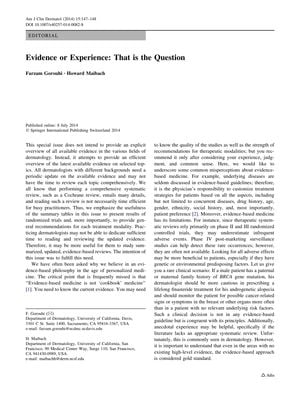Evidence or Experience: That Is the Question
July 2014
in “
American Journal of Clinical Dermatology
”

TLDR The editorial concludes that while evidence-based medicine is crucial, doctors should also use their own experience and consider patient preferences in dermatology care.
The editorial from the American Journal of Clinical Dermatology emphasizes the importance of evidence-based medicine in dermatology while acknowledging the limitations and the need for personalized medicine. It highlights that evidence-based medicine is not a one-size-fits-all approach and that clinicians must consider their own experience, judgment, and the individual patient's preferences and history when making treatment decisions. The issue provides summarized evidence-based reviews with tables of randomized trials and general recommendations for various dermatological conditions to assist busy practitioners. It also discusses the limitations of evidence-based medicine, such as the potential underestimation of rare adverse events in systematic reviews and the value of anecdotal experience when high-level evidence is lacking. The editorial concludes by thanking the experts who contributed to the reviews and expressing hope that the issue will serve as a reliable resource for dermatologists. Topics covered in the issue include atopic dermatitis, systemic therapies for psoriasis, mucosal lichen planus, basal cell carcinoma, androgenetic alopecia, hirsutism, diabetic foot ulcer, and alopecia areata.






